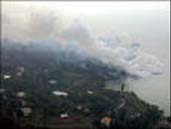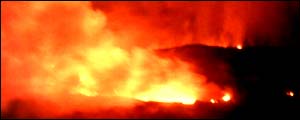Lake
Kivu
 Lake Kivu has never had a lake overturn but along
with Monoun and Nyos it is one of the three lakes in the world
which contain such large amounts of carbon dioxide making it very
possible that the lake could overturn at some point. The lake is
2000 times bigger than Lake Nyos and has a population of two
million people living around its shores.
Lake Kivu has never had a lake overturn but along
with Monoun and Nyos it is one of the three lakes in the world
which contain such large amounts of carbon dioxide making it very
possible that the lake could overturn at some point. The lake is
2000 times bigger than Lake Nyos and has a population of two
million people living around its shores.
Professor Robert Hecky (University of Michigan)
took samples of the sediments of Lake Kivu which gave a record of
the history of the lake going back several thousand years. This
showed that approximately every thousand years an event occurred
which caused all living creatures in the lake to be wiped out and
huge amounts of vegetation to be swept into the lake, which is
consistent with a lake overturn.
If the
lake was to overturn huge amounts of carbon dioxide would be
released, suffocating millions of living creatures, but the lake
also contains a large amount of methane which could cause
explosions above the lake. Kivu contains enough methane to power
the US for a month, and five times as much carbon dioxide –
about 200 km3.

In January 2002 the volcano
Mount N.. made international news when it erupted, pouring molten
lava into the city of Goma in the Democratic Republic of Congo and
also into Lake Kivu prompting concern that this would trigger an
overturn. The lava has stopped flowing into the lake and the Kivu
has remained stable, but after the eruption a crack opened inside
the volcano, forming a tunnel carrying lava deeper under the lake.
The rift in the area is pulling apart and this will cause the crack
to move closer to the bottom of the lake. Huge amounts of boiling
lava entering the bottom of the lake would be a huge energy input
and would be more than sufficient to trigger a large
overturn.
Investigation into how to pipe the gas out of Lake
Kivu is currently
underway.
Image of lake Kivu borrowed without permission from
http://styx.esrin.esa.it/sogha/nyiragongo.html
Image
of eruption borrowed without permission from
http://news.bbc.co.uk/hi/english/world/africa/newsid_1773000/1773206.stm
 Lake Kivu has never had a lake overturn but along
with Monoun and Nyos it is one of the three lakes in the world
which contain such large amounts of carbon dioxide making it very
possible that the lake could overturn at some point. The lake is
2000 times bigger than Lake Nyos and has a population of two
million people living around its shores.
Lake Kivu has never had a lake overturn but along
with Monoun and Nyos it is one of the three lakes in the world
which contain such large amounts of carbon dioxide making it very
possible that the lake could overturn at some point. The lake is
2000 times bigger than Lake Nyos and has a population of two
million people living around its shores.